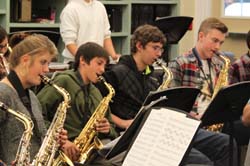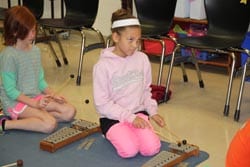 In a lot of school districts, the high school study body is often socially divided, generally by interest or grade level. You might have your athletes, your scholars, your artists and you’ll have your musicians. At New Lebanon CSD, the small size of the district has homogenized these groups, particularly in the music department.
In a lot of school districts, the high school study body is often socially divided, generally by interest or grade level. You might have your athletes, your scholars, your artists and you’ll have your musicians. At New Lebanon CSD, the small size of the district has homogenized these groups, particularly in the music department.
The New Lebanon CSD’s music program spans all grade levels. The faces that make up the high school band and choir come from a mixed bag of social groups and grade levels that work together, along with their teachers, to deliver an outstanding music program in both the school and the community.
 Scott Thompson teaches the instrumental side of the program on the Jr/Sr High School level. According to him, most school districts generally have about a 5 percent participation rate at that level. At New Lebanon, he estimates about 24-35 percent of the student body participates in either band or chorus.
Scott Thompson teaches the instrumental side of the program on the Jr/Sr High School level. According to him, most school districts generally have about a 5 percent participation rate at that level. At New Lebanon, he estimates about 24-35 percent of the student body participates in either band or chorus.
This is no coincidence. Beginning as early as pre-k, students participate in a weekly Music class with teacher Kelsey Boyce, learning the basics such as the difference between a singing voice, speaking voice and shouting voice. They go on to use instruments such as the xylophone and glockenspiel, participate in chorus, and many participate in 6th grade band.
“One of the benefits of starting the music program at an early age is that the students learn to work together collaboratively in a team,” said Boyce.
In addition, the Jr/Sr high school students visit the elementary students to talk to them about band and chorus. They even have an opportunity to perform together.
“The program really starts at the elementary level,” said Thompson. “If they don’t get what they need at that time, it’s easy to quit.”
Once the student reaches the middle school level, they can take General Music or they can participate in junior band, junior choir, or both. At the high school level, the opportunities are even more expansive. Students can participate in high school band and/or choir, as well as jazz band, flute choir (band), marching band, and Black Tie Affair – a choir group that sings contemporary and pop music.
The various groups get real-world experience performing in music festivals, parades, and at retirement homes. The perform for senior citizens from the community at an annual “red carpet” event held in the high school, complete with candle lit table settings, and cuisine from Appetites Anonymous – the school’s food club. They perform with many senior citizens at the two major concerts of the year, winter and spring.
“We have four generations of New Lebanon families singing together at our concerts – you just can’t get that at a larger district,” said Valene Synakowski, who teaches general music as well as junior and senior choir. “There is a sense of family and community here, and the school is the epicenter.”
Music is an integral part of a comprehensive educational experience, says Thomspon.
“It is so important, especially now with all the state testing,” he said. “Music helps students be individually expressive and human, unlike in many traditional classrooms, where there is this push for data driven instruction and standardization.”
In addition, Synakowski said the New Lebanon music program teaches the students lifelong skills such as critical thinking, self-discipline and time management. These are skills necessary to the overall educational experience as well as to a successful college experience and a fulfilling career.
“At New Lebanon, you get a more personalized experience that you wouldn’t get at a larger school. I get to know each and every one of my students. I know when and why they are absent. I know if they’re struggling in another class. We get to know each other and I care about the whole student.”
In New Lebanon, the small-knit school community means students are more accepting of one another and therefore work as a unified voice to create one of the strongest music programs in the region.
